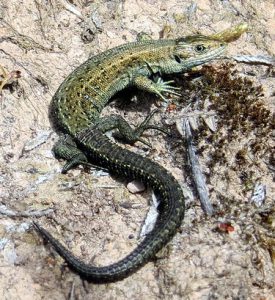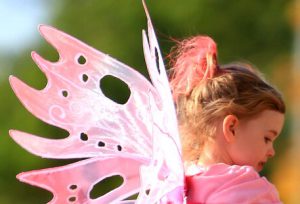I had a somewhat garbled dream in which I was going on adventures, but I had to do it on a schedule, for reasons I couldn’t remember when I woke up. That brought back a memory of how, as a child, I had thought adults’ carefully planned schedules were beyond ridiculous.
At first, the dream didn’t seem like it meant anything in particular. When it came to mind again, though, I decided to take a few minutes to visit my imaginary younger selves in Channelwood village. I was curious about what they thought of adventures and schedules. The two youngest children, seven-year-old Ponch and five-year-old Peter, were playing on a rocky hillside near the beach.
Although it was winter in Channelwood as in real life, the island’s milder climate made it feel more like spring. Ponch had on the woven poncho that inspired the nickname, and her companion wore a favorite green jacket that suited the Peter Pan persona. A large basket, tilted at a rather precarious angle, rested on the ground beside the children.
“What adventures do you have on your schedule for today?” I made my way down the hillside toward them, half expecting to be told I was asking a silly grown-up question.
“We’re taking care of a baby dragon.” Ponch spoke in a cheerful tone that suggested she found no fault with my choice of words. “Want to see?”
Before I had time to answer yes or no, she already had lifted the basket’s lid just a little, giving me a peek at its inhabitant. Looking back at me was, curled in a corner, what appeared to be a small and very ordinary-looking lizard. The floor of the basket was lined with sand, twigs, and rocks.
(Creative Commons image via flickr)
A shallow bowl, evidently intended as drinking water, had mostly spilled into the corner opposite the lizard because of the basket’s careless placement on the slope. Ponch quickly shut the lid again, before the lizard could get any ideas of escaping—although it didn’t look motivated to do anything but go back to sleep.
“How do you tell the difference between a baby dragon and an ordinary lizard?” While I certainly wasn’t trying to put a damper on the children’s pretending, I did wonder what explanation they might give for the creature’s lack of wings.
“All baby dragons start out as ordinary lizards,” Peter announced, in an earnest, professorial tone. “To change into dragons, first they have to be sprinkled with fairy dust at sunrise. After that, they have to be kept in a basket all day, so that they don’t fly away before their wings are grown. Also, they need to drink a magic potion. Then, after sunset, the basket has to be opened just as the moon is rising. When the moonlight first touches the dragon, the wings grow to their full length, and the dragon flies off to learn the ways of dragons in a far-away land.”
“And then,” Ponch put in, filling out the day’s schedule with more practical details, “Sara will call us for dinner. Because it is still winter, sunset comes early. We’re having fish for dinner; Queenie caught them this morning. Ella makes the best baked fish, yum.”
“Sounds good,” I agreed. “I’d say your adventures have a well-planned schedule. Better than my grown-up chores.”
Ponch gave me a smile in return. Peter’s dismissive shrug, meanwhile, made plain the very idea of being grown up didn’t merit a moment’s thought.








